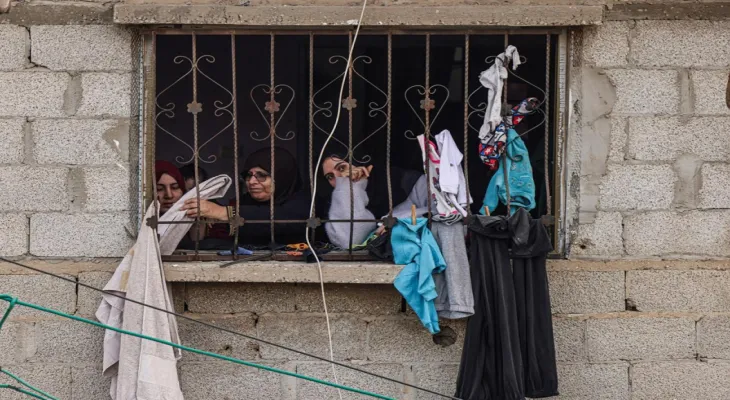Search here
Newspaper
Search here

Arab Canada News
News

Published: December 25, 2023
Ruwaida now has other concerns for the second day of every month – it is the time of her menstrual cycle "period," and it no longer passes normally after the feminine sanitary pads ran out in the Gaza Strip, and she thinks a lot about what she will wear when the blood comes.
Following the Israeli war in Gaza and the division of the strip into two parts, the factories producing feminine sanitary pads located in Gaza City in the northern part stopped, and due to the closure of crossings, the import of goods completely halted. As a result of the long war duration, most feminine hygiene products ran out.
A psychological nightmare
Ruwaida never imagined that sanitary pads would be among the precious items for which obtaining even a single pack would feel like a miracle, and that her menstrual cycle appointment would become a nightmare for her, turning her mood upside down.
During the war, Ruwaida's period came twice; in the first month, she roamed pharmacies and hospitals to get sanitary pads sufficient for seven days, but she did not find them. She says, "This is a humanitarian crisis threatening women's health; it worries me greatly."
Angry Ruwaida adds, "All pharmacies, hospitals, and shopping centers are devoid of sanitary pads. I search daily for pads needed by all women anywhere in the world and do not find them. The simplest human essentials have become unavailable. I feel ashamed and humiliated."
Worn-out clothes
Ruwaida was forced to make unhygienic pads from worn-out clothes that she collected from among the rubble, but she points out that she changes them only twice a day. In addition, she washes the fabric pieces and reuses them.
According to World Health Organization guidelines, a menstruating woman needs at least 20 sanitary pads during her period days, and it is healthy to change them several times a day regardless of blood flow intensity. However, this is a luxury for Ruwaida, who cannot find pads at all.
Shaimaa complains about the shortage of sanitary pads, saying, "I cannot imagine a woman who needs pads and does not find them. What would she do? Honestly, I felt very embarrassed when the pharmacist informed me they had run out. My psychological state worsened a lot, and this reflected on my children and husband."
Newspaper papers
The situation is more complicated for Shaimaa; she lives in a shelter tent and shares the bathroom with hundreds of displaced persons. She adds, "There is no water; if available, most of it is unclean. This is a form of torture in the war, making the spread of women's diseases a disaster added to the series of disasters brought by the fighting."
Shaimaa showers only once every two weeks and uses newspaper paper instead of sanitary pads. She continues, "I heard that some women use cloth, but I fled without bringing enough clothes and suffer from a shortage of pants, so I use newspaper when my period comes because all feminine hygiene supplies are unavailable."
At the beginning of the war, pharmacies had a stock of sanitary pads and sold each adult woman only one pack monthly, but now they are exhausted. In Gaza, there are 500 births daily, and the sector needs an average of 50,000 sanitary pad units daily.
Menstruation prevention pills
Sarah says, "Women in Gaza went through about two to three menstrual cycles during the war. The lack of sanitary pads is a crisis; it concerns our psychological and physical lives."
Sarah uses menstruation prevention pills to delay her period, which caused her much pain, but she is forced to endure the pain and prefers it over what she describes as "discomfort and devaluation."
Mary Reveal, the emergency coordinator for Doctors Without Borders in Gaza, noted that since the war began, requests for contraception methods have quadrupled, and purchasing menstruation delay pills has increased sevenfold because women no longer want to face their menstrual cycle.
Alternative tissues
Maram feels like she has returned to the Stone Age after settling in a displacement school. She confirms that "things are very harsh in Gaza after losing sanitary pads, and she does not know what awaits her next." She has started using tissues "handkerchief paper," explaining that she tries to cope with the situation but there are no safe hygienic alternatives.
According to the Palestinian Central Bureau of Statistics (a governmental institution), one million females live in the Gaza Strip, 49% of whom are of menstruating age, and all of them need sanitary pads.
Fidaa points out that she searched all southern Gaza governorates for sanitary pads and did not find any, so she used baby diapers instead. She says, "We divide the diaper into two parts so that we can use it twice. This solution has become difficult as baby diapers have become unavailable or expensive."
Infectious diseases
Human Rights Watch published a report on the impacts of the war on women stating, "During menstruation, a woman in Gaza cannot maintain hygiene and fails to meet the necessities of this condition due to the shortage of sanitary pads. This may lead to hepatitis B and fungal vaginal infections. Many use menstrual products for longer than expected, increasing the risk of infection."
Obstetrics and gynecology specialist Reem Bashir says, "What Gaza women use are contaminated tools instead of sanitary pads, which may cause bacterial infections that can reach the uterus and fallopian tubes, potentially resulting in pelvic inflammation that could lead to blood poisoning."
Bashir adds, "Women in Gaza have already been infected with a type of staphylococcal bacteria arising from poor hygiene and not using proper sanitary pads."
Comments